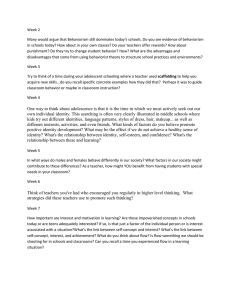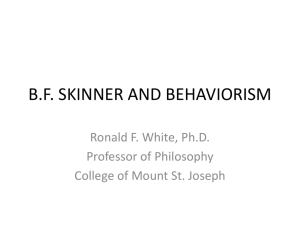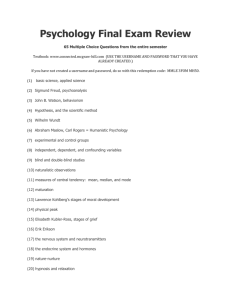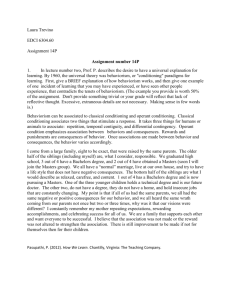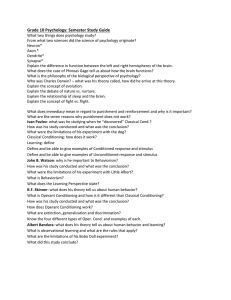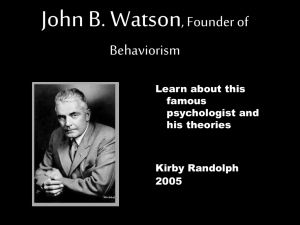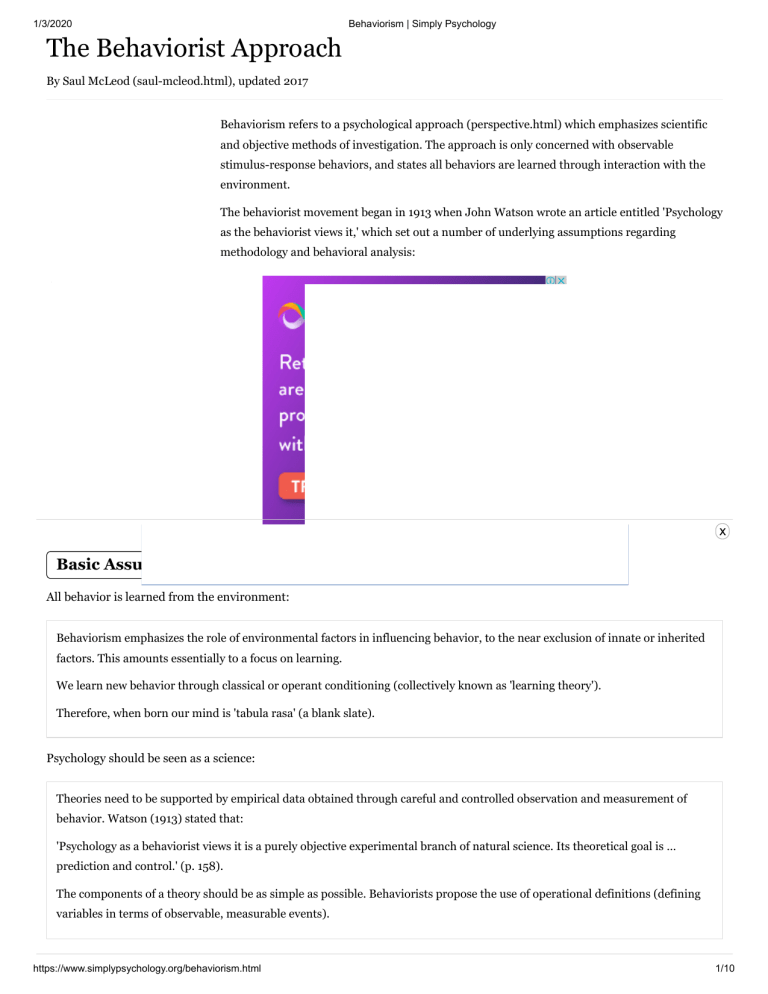
1/3/2020 Behaviorism | Simply Psychology The Behaviorist Approach By Saul McLeod (saul-mcleod.html), updated 2017 Behaviorism refers to a psychological approach (perspective.html) which emphasizes scientific Get cinema-quality VFX crafted by industry pros. and objective methods of investigation. The approach is only concerned with observable stimulus-response behaviors, and states all behaviors are learned through interaction with the environment. The behaviorist movement began in 1913 when John Watson wrote an article entitled 'Psychology Explore Elements as the behaviorist views it,' which set out a number of underlying assumptions regarding methodology and behavioral analysis: x Basic Assumptions All behavior is learned from the environment: Behaviorism emphasizes the role of environmental factors in influencing behavior, to the near exclusion of innate or inherited factors. This amounts essentially to a focus on learning. We learn new behavior through classical or operant conditioning (collectively known as 'learning theory'). Therefore, when born our mind is 'tabula rasa' (a blank slate). Psychology should be seen as a science: Theories need to be supported by empirical data obtained through careful and controlled observation and measurement of behavior. Watson (1913) stated that: 'Psychology as a behaviorist views it is a purely objective experimental branch of natural science. Its theoretical goal is … prediction and control.' (p. 158). The components of a theory should be as simple as possible. Behaviorists propose the use of operational definitions (defining variables in terms of observable, measurable events). https://www.simplypsychology.org/behaviorism.html 1/10 1/3/2020 Behaviorism | Simply Psychology Behaviorism is primarily concerned with observable behavior, as opposed to internal events like thinking and emotion: x While behaviorists often accept the existence of cognitions and emotions, they prefer not to study them as only observable (i.e., external) behavior can be objectively and scientifically measured. Therefore, internal events, such as thinking should be explained through behavioral terms (or eliminated altogether). There is little difference between the learning that takes place in humans and that in other animals: There's no fundamental (qualitative) distinction between human and animal behavior. Therefore, research can be carried out on animals as well as humans (i.e., comparative psychology (comparative-psychology.html)). Consequently, rats and pigeons became the primary source of data for behaviorists, as their environments could be easily controlled. Ad DMCI Homes' first exclusive residential community in Cebu. GET QUOTE Behavior is the result of stimulus-response: All behavior, no matter how complex, can be reduced to a simple stimulus-response association). Watson described the x purpose of psychology as: 'To predict, given the stimulus, what reaction will take place; or, given the reaction, state what the situation or stimulus is that has caused the reaction.' (1930, p. 11). Types of Behaviorism Historically, the most significant distinction between versions of behaviorism is that between Watson's original 'methodological behaviorism,' and forms of behaviorism later inspired by his work, known collectively as neobehaviorism (e.g., radical behaviorism). Methodological Behaviorism Watson's article 'Psychology as the behaviorist views it' is often referred to as the 'behaviorist manifesto,' in which Watson (1913, p. 158) outlines the principles of all behaviorists: https://www.simplypsychology.org/behaviorism.html 2/10 1/3/2020 Behaviorism | Simply Psychology x 'Psychology as the behaviorist views it is a purely objective experimental branch of natural science. Its theoretical goal is the prediction and control of behavior. Introspection forms no essential part of its methods, nor is the scientific value of its data dependent upon the readiness with which they lend themselves to interpretation in terms of consciousness. The behaviorist, in his efforts to get a unitary scheme of animal response, recognizes no dividing line between man and brute. The behavior of man, with all of its refinement and complexity, forms only a part of the behaviorist's total scheme of investigation'. Radical Behaviorism Radical behaviorism was founded by B.F Skinner (operant-conditioning.html) and agreed with the assumption of methodological behaviorism that the goal of psychology should be to predict and control behavior. Skinner, like Watson, also recognized the role of internal mental events, and while he agreed such private events could not be used to explain behavior, he proposed they should be explained in the analysis of behavior. Another important distinction between methodological and radical behaviorism concerns the extent to which environmental x factors influence behavior. Watson's (1913) methodological behaviorism asserts the mind is tabula rasa (a blank slate) at birth. In contrast, radical behaviorism accepts the view that organisms are born with innate behaviors, and thus recognizes the role of genes and biological components in behavior. History of Behaviorism Pavlov (pavlov.html) (1897) published the results of an experiment on conditioning after originally studying digestion in dogs. Watson (1913) launches the behavioral school of psychology, publishing an article, Psychology as the behaviorist views it (https://psychclassics.yorku.ca/Watson/views.htm). Watson and Rayner (classical-conditioning.html#little) (1920) conditioned an orphan called Albert B (aka Little Albert) to fear a white rat. Thorndike (edward-thorndike.html) (1905) formalized the Law of Effect. Skinner (operant-conditioning.html) (1936) wrote The Behavior of Organisms and introduced the concepts of operant conditioning and shaping. Clark Hull’s (1943) Principles of Behavior (http://s-f-walker.org.uk/pubsebooks/pdfs/Principles%20of%20Behavior%20%20Clark%20Hull.pdf) was published. https://www.simplypsychology.org/behaviorism.html 3/10 1/3/2020 Behaviorism | Simply Psychology B.F. Skinner (1948) published Walden Two, in which he described a utopian society founded upon behaviorist principles. x Journal of the Experimental Analysis of Behavior (http://onlinelibrary.wiley.com/journal/10.1002/(ISSN)1938-3711) begun in 1958. Chomsky (1959) published his criticism of Skinner's behaviorism, "Review of Verbal Behavior." Bandura (bandura.html) (1963) publishes a book called the Social Leaning Theory and Personality development (http://www.jku.at/org/content/e54521/e54528/e54529/e178059/Bandura_SocialLearningTheory_ger.pdf) which combines both cognitive and behavioral frameworks. B.F. Skinner (1971) published his book, Beyond Freedom and Dignity (http://selfdefinition.org/psychology/BF-SkinnerBeyond-Freedom-&-Dignity-1971.pdf), where he argues that free will is an illusion. Behaviorism Summary Key Features Stimulus-Response Operant Conditioning (operant-conditioning.html) Schedules of Reinforcement (operant-conditioning.html#sch) Classical Conditioning (classical-conditioning.html) Nomothetic (nomothetic-idiographic.html) x Reductionism (reductionism-holism.html) Methodology / Studies Contolled Experiment (controlled-experiment.html) Little Albert (classical-conditioning.html#little) Bobo Doll Study (bobo-doll.html) Skinner Box (operant-conditioning.html#operant) Pavlov's Dogs (pavlov.html) Ethical Considerations (Ethics.html) Basic Assumptions Psychology should be seen as a science, to be studied in a scientific manner. Behaviorism is primarily concerned with observable behavior, as opposed to internal events like thinking. https://www.simplypsychology.org/behaviorism.html 4/10 1/3/2020 Behaviorism | Simply Psychology Behavior is the result of stimulus–response (i.e., all behavior, no matter how complex, can be reduced to a simple stimulus – x response features). Behavior is determined by the environment (e.g., conditioning, nurture). Areas of Application Gender Role Development Behavioral Therapy (behavioral-therapy.html) Phobias (classical-conditioning.html#little) Education (operant-conditioning.html#class) Behavior-Modification (operant-conditioning.html#mod) Psychopathology (abnormal-psychology.html#behav) Depression (depression.html#be) Relationships Moral Development Aggression (bobo-doll.html) Addiction x Strengths The behaviorist approach provides clear predictions. This means that explanations can be scientifically tested and support with evidence. Real life applications (e.g., therapy) Emphasizes objective measurement Many experiments to support theories Identified comparisons between animals (Pavlov) and humans (Watson & Rayner - Little Albert) Limitations Ignores mediational processes Ignores biology (e.g., testosterone) Too deterministic (little free-will) https://www.simplypsychology.org/behaviorism.html 5/10 1/3/2020 Behaviorism | Simply Psychology x Experiments – low ecological validity Humanism – can’t compare animals to humans Reductionist Critical Evaluation An obvious advantage of behaviorism is its ability to define behavior clearly and to measure changes in behavior. According to the law of parsimony, the fewer assumptions a theory makes, the better and the more credible it is. Behaviorism, therefore, looks for simple explanations of human behavior from a very scientific standpoint. However, behaviorism only provides a partial account of human behavior, that which can be objectively viewed. Important factors like emotions, expectations, higher-level motivation are not considered or explained. Accepting a behaviorist explanation could prevent further research from other perspective that could uncover important factors. In addition, humanism (humanistic.html) (e.g., Carl Rogers) rejects the scientific method of using experiments to measure and control variables because it creates an artificial environment and has low ecological validity. Humanistic psychology also assumes that humans have free will (freewill-determinism.html) (personal agency) to make their own decisions in life and do not follow the deterministic laws of science (science-psychology.html). Humanism also rejects the nomothetic approach (nomothetic-idiographic.html) of behaviorism as they view humans as being unique and believe humans cannot be compared with animals (who aren’t susceptible to demand characteristics). This is known as an idiographic approach. The psychodynamic approach (psychodynamic.html) (Freud) criticizes behaviorism as it does not take into account the unconscious mind’s (unconscious-mind.html) influence on behavior, and instead focuses on externally observable behavior. Freud x also rejects the idea that people are born a blank slate (tabula rasa) and states that people are born with instincts (e.g., eros and thanatos). Biological psychology (biological-psychology.html) states that all behavior has a physical/organic cause. They emphasize the role of nature over nurture. For example, chromosomes (gender-biology.html#chrom) and hormones (gender-biology.html#hormones) (testosterone) influence our behavior too, in addition to the environment. Cognitive psychology (cognitive.html) states that mediational processes occur between stimulus and response, such as memory (memory.html), thinking, problem-solving, etc. Despite these criticisms, behaviorism has made significant contributions to psychology. These include insights into learning, language development, and moral and gender development, which have all been explained in terms of conditioning. The contribution of behaviorism can be seen in some of its practical applications. Behavior therapy (behavioral-therapy.html) and behavior modification (operant-conditioning.html#mod) represent one of the major approaches to the treatment of abnormal behavior (abnormal-psychology.html) and are readily used in clinical psychology. (simplypsychology.org-Behaviorist-Approach.pdf) Download this article as a PDF (simplypsychology.org-Behaviorist- Approach.pdf) https://www.simplypsychology.org/behaviorism.html 6/10 1/3/2020 Behaviorism | Simply Psychology x How to reference this article: McLeod, S. A. (2017, Feb 05). Behaviorist approach. Simply Psychology. https://www.simplypsychology.org/behaviorism.html APA Style References Bandura, A., & Walters, R. H. (1963). Social learning and personality development. New York: Holt, Rinehart, & Winston. Chomsky, N. (1959). A review of BF Skinner's Verbal Behavior (http://pubman.mpdl.mpg.de/pubman/item/escidoc:2309516/component/escidoc:2309514/Chomsky_1959_Review_Skinner.pdf). Language, 35(1), 26-58. Hull, C. L. (1943). Principles of behavior: An introduction to behavior theory (http://s-fwalker.org.uk/pubsebooks/pdfs/Principles%20of%20Behavior%20-%20Clark%20Hull.pdf). New York: Appleton-CenturyCrofts. x Pavlov, I. P. (1897). The work of the digestive glands. London: Griffin. Skinner, B. F. (1948). Walden two. New York: Macmillan. Skinner, B. F. (1971). Beyond freedom and dignity (http://selfdefinition.org/psychology/BF-Skinner-Beyond-Freedom-&Dignity-1971.pdf). New York: Knopf. Thorndike, E. L. (1905). The elements of psychology. New York: A. G. Seiler. Watson, J. B. (1913). Psychology as the behaviorist views it (https://psychclassics.yorku.ca/Watson/views.htm). Psychological Review, 20, 158-178. Watson, J. B. (1930). Behaviorism (revised edition). University of Chicago Press. Watson, J. B., & Rayner, R. (1920). Conditioned emotional reactions (https://psychclassics.yorku.ca/Watson/emotion.htm). Journal of Experimental Psychology, 3, 1, pp. 1–14. Terminology Classical Conditioning Classical conditioning refers to learning by association, and involves the conditioning of innate bodily reflexes with new stimui. Stimulus https://www.simplypsychology.org/behaviorism.html 7/10 1/3/2020 Behaviorism | Simply Psychology x Any feature of the environment that affects behavior. E.g. in Pavlov’s experiments food was a stimulus. Response The behavior elicited by the stimulus. E.g. in Pavlov’s experiments salivation was a response. Operant Conditioning Operant conditioning involves learning through the consequences of behavior. Positive Reinforcement Presenting the subject with something that it likes. e.g., Skinner rewarded his rats with food pellets. Negative Reinforcement Reward – in the sense of removing or avoiding some aversive (painful) stimulus. e.g., Skinner's rats learned to press the lever in order to switch off the electric current in the cage. Punishment x Imposing an aversive or painful stimulus. e.g., Skinner’s rats were given electric shocks. Social Learning Theory Social Learning Theory posits that people learn from one another, via observation, imitation, and modeling. The theory has often been called a bridge between behaviorist and cognitive learning theories because it encompasses attention, memory, and motivation. Reductionism Reductionism is the belief that human behaviour can be explained by breaking it down into smaller component parts. Reductionists say that the best way to understand why we behave as we do is to look closely at the very simplest parts that make up our systems, and use the simplest explanations to understand how they work. Behaviorism reduces all behavior (no matter how complex) to stimulus-response associations. Further Information https://www.simplypsychology.org/behaviorism.html 8/10 1/3/2020 Behaviorism | Simply Psychology x Classical Conditioning (classical-conditioning.html) Operant Conditioning (operant-conditioning.html) Pavlov's Dogs (pavlov.html) Edward Thorndike (edward-thorndike.html) Social Learning Theory (bandura.html) Bobo Doll Study (bobo-doll.html) Behavioral Therapy (behavioral-therapy.html) MIT Lecture (Conditioning.rm) Operant Conditioning (Operant%20Conditioning.pdf) (simplypsychology.org-Behaviorist-Approach.pdf) Download this article as a PDF (simplypsychology.org-Behaviorist- Approach.pdf) How to reference this article: McLeod, S. A. (2017, Feb 05). Behaviorist approach. Simply Psychology. x https://www.simplypsychology.org/behaviorism.html Google Site Search (https://www.printfriendly.com) Home (/) | About (about.html) | A-Z Index (simplypsychology-index.html) | Privacy Policy (privacy.html) | Contact Us (contact.html) Back to top This workis licensed under a Creative Commons (https://creativecommons.org/licenses/by-nc-nd/3.0/) AttributionNoncommercial-No Derivative Works 3.0 Unported License. Company Registration no: 10521846 https://www.simplypsychology.org/behaviorism.html 9/10 1/3/2020 Behaviorism | Simply Psychology x (https://www.ezoic.com/what-is-ezoic/) https://www.simplypsychology.org/behaviorism.html report this ad 10/10
